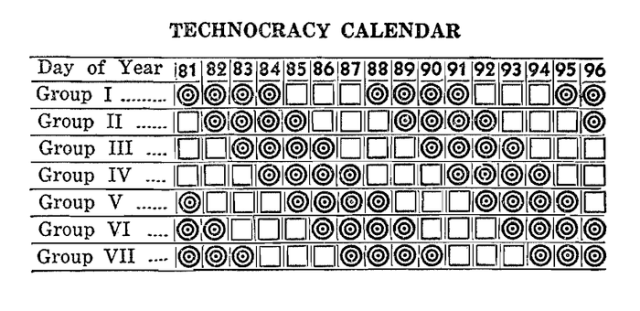Technocracy was a movement in the late 1920's, 30s, and 40s in the Americas that was gaining heavy momentum. Sadly, in the late 1930s the Canadian government banned the political party from 1940-1942 that disrupted and stunted the growth of the party forever, as most of their growth was in Canada (or so it would seem, there is a heavy resurgence growing today!).
Originally a socialist movement spearheaded by engineers that believed that the political system relied too heavily on career politicians and an elite class than experts and the working class.
Technocracy was the realization that the majority of jobs and power relied on the workers, engineers, and mostly those who were part of manufacturing, farming, and other related fields (keep in mind, this was the early 20th century whereas now most modern jobs are in services and retail, sadly).
They believed that instead of having armchair experts dictate everything, everyone, and the whims of the political world - that the power should be more appropriately vested in engineers and workers.
They believed that we should only work a four hour day, on a four week using this as a 'calendar':

Where manufacturing workers (and most workers) would be working in shifts of four days a week, four hours a day, with three days off of work. Not only would this ensure that everyone was working, but this would equally ensure that we could have full production and productivity could rise higher than every before. This wouldn't work for most industries, but it would form a basis that *could *work in nearly all jobs.
Their belief was to maximize work, so that humanity can finally have more time for leisure. Entire industries would be nationalized, we would have universal healthcare, universal education, they believed that all citizens should have the right to vote regardless of color or race, they believed in womens rights, and a whole slew of more.
They opposed oppressive militaries, believed funding would be better allocated to public infrastructure than the war machine, and that the government should fund farms and factories to produce core needs such as tools and food so that every citizen should have the right and ability to eat (and use the technocratic calendar to ensure that we could!). They also believed that we could use technology to increase resourcefulness and build a better more rounded society, and a more equal world than ever before through automation, better growing patterns, better tools, better, well everything.
Decisions would be based around tribunals of engineers and experts in fields (could you imagine how quickly the pandemic would have ended if this were the case?). They still had a democratic base, you could publicly veto, you could vote, you could do everything you can in a normal democratic society - but the core choices would be debated by experts and the public could decide based on a specialized councils decisions. These experts could also be voted by the public to special councils. There have been many comparisons to communism, but this is not the case - while they both had similar core values in socialism, they are quite different in forms of the concentration of power and ability. There were still separate but equal different branches of governments, and more of a democratic flavor than the preferred more authoritarian models that the other communist-flavored movements held.
But, again, the movement that grew from nothing to close to 50,000 official members was eventually discarded and destroyed as pre-existing governments were wary of the changes.
There is still a place for the movement, especially as technology has created the greatest revolution that the world has ever seen in terms of education, food equality, social equality, and leisure. I believe that once we reach the highest point of revolution (or reformation), and we have, a new form of economic and political systems will begin to be tested and put in place, and while they will be more reminiscent of communist and socialist theory than hypercapitalism, I do believe that many of the core components of communism are outmoded or outdated for the modern world. That doesn’t mean they can’t be warped (positively, or negatively) but that the core basis is fundamentally flawed for the world we live in.
The people will win, they always have, but stretches of nationalism and fascist thoughts have been quite pervasive for rather short periods of time in all sections of human history regardless of the overall outcome. We are at the breaking point where we could become part of another, sad, part of history or we can minimize that time frame and push forward. It’s inevitable, but we can always work to make it less harsh,or less disastrous as it would have been. I am a pessimistic optimist, but capitalism, in its current form, will end faster than most believe.
